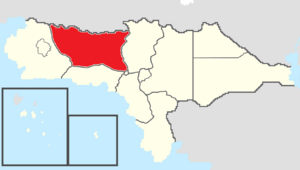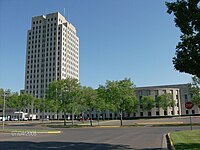Charlotte (state)
This article is incomplete because it is pending further input from participants, or it is a work-in-progress by one author. Please comment on this article's talk page to share your input, comments and questions. Note: To contribute to this article, you may need to seek help from the author(s) of this page. |
State of Charlotte
État de Charlotte | |
|---|---|
State | |
| Nickname: The Free State | |
| Motto: "Forward" | |
 Map of Rizealand with Charlotte in red | |
| Country | |
| Before Statehood | Providence Territory |
| Capital (and largest city) | Ardougne |
| Joined Federation | July 4, 1796 (4th) |
| Government | |
| • Secretary General | Philip Lucroy (TNC-CRP) |
| • Legislature | Charlotte State Senate |
| • Federal councillors | Appointed
Elected |
| • Federal representatives | |
| Area | |
| • Total | 247,845.34 km2 (95,693.62 sq mi) |
| Population (2021) | |
| • Total | 3,597,600 |
| • Density | 14.52/km2 (37.6/sq mi) |
| Time zone | UTC+9 to +10 (Western/Central) |
| Abbreviation | CH |
| ISO 3166 code | RZ-CH |
| Website | www |
Charlotte, known officially as the State of Charlotte and unofficially as "CH" or "État de Charlotte", is a state in northwestern Rizealand that is bordered by Cassier to the north, Providence to the east, the Capital Territory to the southeast, Lothicania to the south, and New Estmere to the west. Charlotte has a total area of 247,845.34 square kilometers, making it the third largest state and political division of Rizealand. Charlotte also has a population of 3,597,600, making it the seventh most populous state and political entity. Charlotte's capital and largest city is Ardougne. It is also home to several other large cities including East Ardougne, La Salle, and New Verlois.
Etymology
The "State of Charlotte" is named after the Province of Charlotte, a Gaullican administrative division formed out of the eastern half of the Colony of New Estmere in 1725. Following the independence and establishment of Rizealand in 1773, the Province of Charlotte was annexed and declared part of the Providence Territory. The western half of the Providence Territory was successfully granted statehood as the "State of Charlotte" in 1796, despite some initial controversy over its retention of a Gaullican colonial name.
Geography
Charlotte is located in northwestern Rizealand and has a total area of 247,845.34 square kilometers, making it the third largest state and political division of Rizealand. The highest point in Charlotte is Sinclair Peak in the Clarbagne Mountains at 4,956 meters above sea level. The lowest point is the Attakapepnok River at the confluence of the Weanoke River at 151 meters above sea level. The lower or southern half of Charlotte is located within the upper portion of the White River Valley and the edge of the Weanoke River Valley. The northeast part of the state is located within the Attakapepnok River Valley, although the eastern border is marked by the Bergeyonne River which connects to the Attakapepnok River. The northwest part of the state is very mountainous, including the Clarbagne Mountains, the Great Smoky Mountains, Mount Delacroix, and Mount Pascal.
Ecology
Most of Charlotte is covered by temperate coniferous forest although areas along major rivers have less forest due to deforestation and clearing for industrial or agricultural purposes. The Clarbagne Mountains in the northwest corner of the state are covered in boreal forests and mountainous areas of the state have different varieties of fir trees, larch, spruce, and hemlock. In the lower forests and valleys, there are different varieties of douglas fir, oak, maple, beech, birch , walnut, ash, and redwood. Other plants growing in Charlotte include bunch grass, festuca grass, rye grass, sedges, rushes, shadbush, blackberry, dogwood, snowberry, mouse ears, gentians, dandelion, aster, orchid, and roses.
Charlotte has many species of birds including loon, duck, goose, eagle, tern, snipe, heron, hawk, Asterian condor, owl, wren, thrush, hummingbird, sparrow, woodpecker, swallow, chickadee, warbler, finch, Asterian robin, crow, cardinal, new world oriole, meadowlark, blackbird, wild turkey, grouse, pheasant, and pigeon. Charlotte also has other land mammals including deer, wapiti, pronghorn, bighorn sheep, mountain goat, Asterian black bear, Asterian brown bear, muskrat, fox, mink, raccoon, opossum, Asterian beaver, skunk, marmot, cottontail rabbit, snowshoe hare, red squirrels, gray squirrels, ground squirrel, bushdog, mountain lion, and wildcat.
Reptiles and amphibians located throughout Charlotte include garter snake, kingsnake, rattlesnake, horned lizard, spiny lizard, side-blotched lizard, skink, painted turtle, salamander, and the frog. In the freshwater lakes and rivers throughout the state, there are trout, bass, perch, muskellunge, carp, bearded fish, pike, shrimp, and mussel.
Climate
Conservation
Demographics
Population
Language
Religion
Health
Education
Urban Areas
Government and politics
The government of Charlotte is established and organized according to the Constitution of Charlotte. Because Charlotte is a constituent state of Rizealand, the powers of its government are subject to certain limits by the Articles of Federation including the requirement of a democratic form of government and prohibitions on forming alliances with foreign governments, declaring war, raising or maintaining armies, establishing forms of currency, and placing unlawful restraints on interstate and international trade. In addition to constitutional restraints on state power, the Articles also allow the Central Assembly to enact legislation that can supersede state laws when involving national security, interstate commerce, foreign affairs, immigration, and the public's welfare. Like the federal government of Rizealand, the government of Charlotte is divided into three branches of government.
The legislative branch consists of the bicameral Charlotte State Senate. The First Chamber is the larger and lower chamber of the Senate with 100 seats that are filled through closed party list proportional representation elections held every five years. The Second Chamber is the upper chamber of the Senate with 72 seats. One senator in the Second Chamber is elected from each of the parishes in two-round direct elections for a five-year term. While a majority vote of the First Chamber is required to pass legislation and take most forms of legislative action, the Second Chamber can block, amend, or propose legislation only with a majority of 60%. A supermajority of three-fourths in required in both chambers to enact super laws. The First Chamber is also responsible for initiating all taxation and appropriation legislation, appointing the Secretary General, and has the authority to vote on a motion of no confidence which if successful, has the effect of dismissing the Secretary General and triggering elections. The Second Chamber is responsible for approving the Secretary General's appointments to independent agencies and commissions and can remove the Secretary General or other state government officials from office with a three-fourths majority without triggering new elections.
The executive branch is headed by the Secretary General of Charlotte, who serves as the head of state and government. The Secretary General is appointed by the First Chamber of the Senate following legislative elections and serves at the pleasure of the First Chamber, who can dismiss him with a vote of no confidence. The Secretary General is responsible for forming a government following his appointment which includes appointing executive agency heads and is also responsible for enforcing and executing the laws of the state. The Secretary General also nominates the leaders and members of independent agencies and commissions.
The judicial branch consists of the High Court, circuit courts of appeal, circuit courts of justice, and parish courts, which have limited jurisdiction to decide misdemeanor, juvenile, traffic, small claims, probate, and family law cases. All justices and judges are elected in two-round direct elections for five-year terms.
There are also independent agencies and commissions established by state super laws that do not neatly fit into any branch of government, as they often enforce state laws (executive), issue rules and regulations (legislative), and adjudicate cases or claims (judicial). Their agency heads or commission members are usually nominated by the Secretary General and appointed by the Second Chamber of the Senate. They can only be removed from office by a three-fourths majority of the Second Chamber.
Charlotte has a civil law legal system with significant Gaullic influence and is governed by the Charlotte Civil Code, which is based on Solarian Law, Verliquoian Law, and the Evelin Code. In addition to the protections of the Articles of Federation, the Charlotte Constitution also establishes additional protections and gives citizens the right to trigger new elections or recall state officials, refer legislation to a referendum vote, enact legislation via an initiative vote, and approve amendments to the state constitution.



